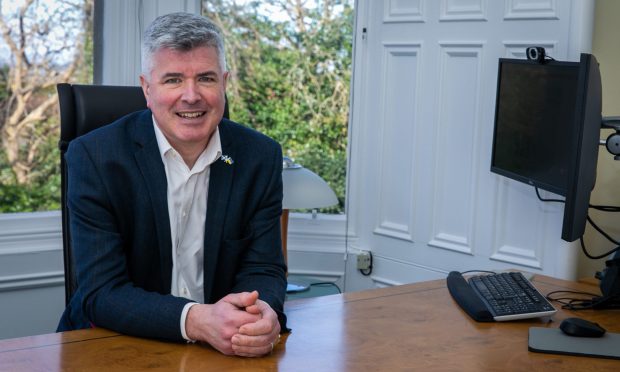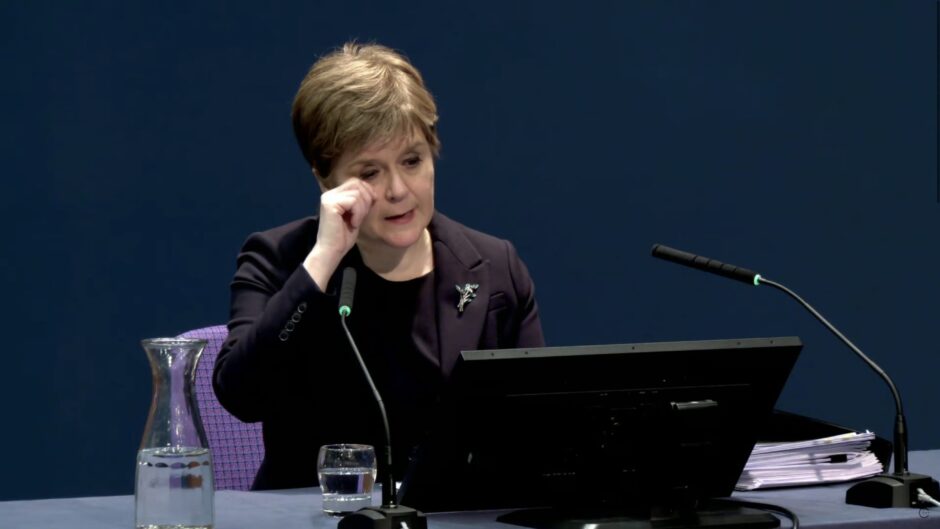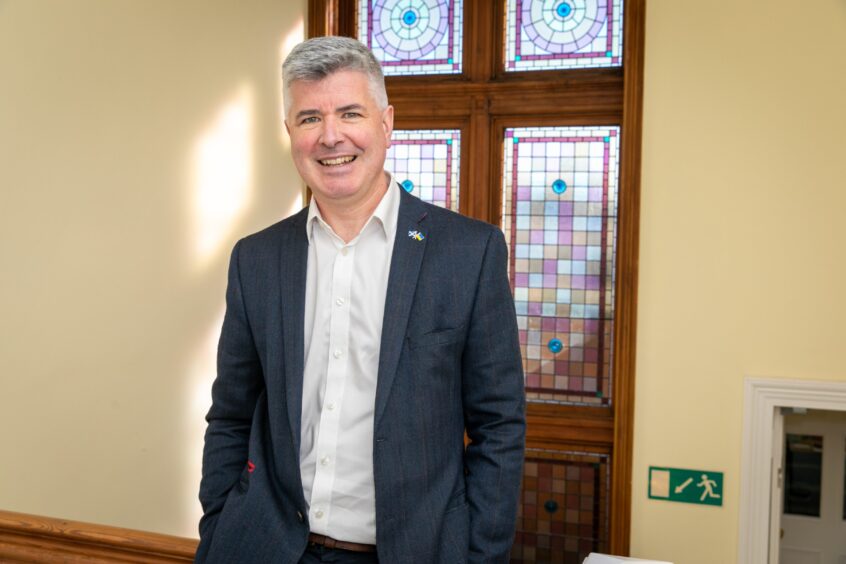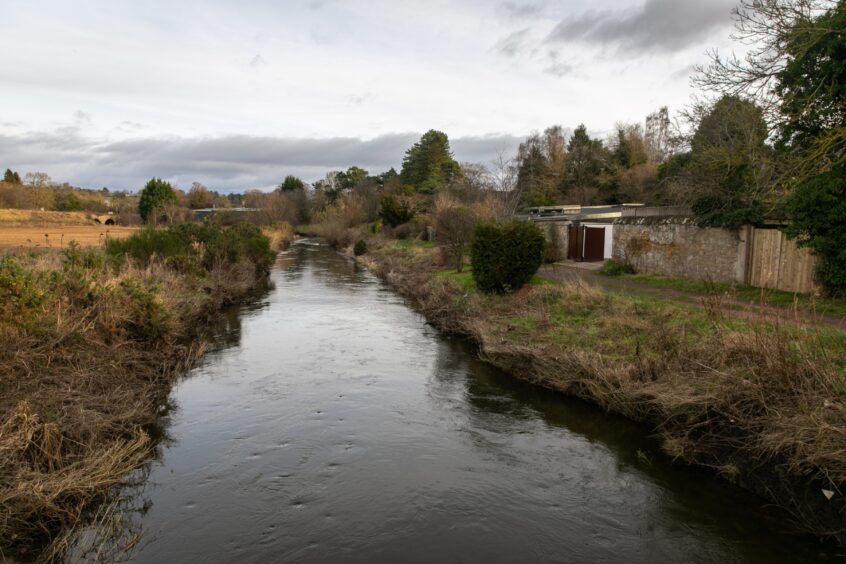St Andrews-based information commissioner David Hamilton has found himself at the heart of a row that goes straight to the heart of how Scotland is governed less than a year into his new job.
In February, Mr Hamilton stated that the inquiry had raised “significant practice” concerns over how Scottish ministers used messaging services such as WhatsApp.
And now, in his first interview with The Courier since taking on the role, the 52-year-old retired Scottish Police Federation chief has warned that as well as political reputations, the very principles of justice and Freedom of Information legislation are at stake.
Headlines were made when Scottish government figures, including the then First Minister Nicola Sturgeon, confirmed they had deleted messages that referred to government business during the pandemic.
The Scottish government said it would co-operate as required.
Mr Hamilton believes that failing to retain a full record of the decision-making process had “subverted the principles” of freedom of information legislation.
He said he would officially launch an “intervention” to make practice recommendations.
However, while he insists he won’t be commenting further on his intervention until the UK Covid inquiry concludes, he’s told The Courier he thinks the inquiry is being “frustrated by lack of access to information” – and if the inquiry is being frustrated, so is everyone else.
Scottish Government must ‘fix’ Freedom of Information access
“My role is incidental to the Covid UK Inquiry and record keeping per se is not my area of responsibility,” he said.
“But when poor record keeping impacts on the public’s right to access information, it does (become my concern).
“The inquiry was deprived of some of the information it needed and so therefore was the public.
“That’s why I have intervened to ensure that the Scottish Government, and others, fix that.”
It’s almost 20 years since The Freedom of Information (Scotland) Act 2002 came into force in early 2005, giving everyone the right to ask for any information held by Scottish public authorities including the government, councils, the NHS and the police.
Based at Kinburn Castle in St Andrews, the Scottish Information Commissioner is responsible for investigating appeals around FOI requests and enforcement of FOI legislation.
Mr Hamilton began his new £77,260 per year job in October, succeeding the outgoing Daren Fitzhenry, who was appointed commissioner in 2017 and who left at the end of his six-year term.
With his department’s 500 appeals a year equating to around 0.6% of the 84,000 FOI requests in Scotland per annum, this should “give people confidence that they are likely to get the information they ask for”, he said.
Taking the view that there’s always room for improvement when it comes to FOI requests, one of the first things he did in December was urge the Scottish government to extend FOI request rights to all bodies now providing public services.
But when ministers said they were “not persuaded” of making major changes in the current parliamentary term, it led Mr Hamilton to conclude that Scotland’s international reputation on FOI had been “harmed” by the decision not to overhaul the system.
That assessment came after ministers claimed the current law was rigorous enough to ensure accountability.
The Scottish government said it would look at how the system could be improved within the existing legislation.
However, he stands by his view that there’s scope for further transparency and improvement.
Freedom of Information legislation has made ‘massive’ impact
“I think it’s massive,” he said when asked what difference FOI legislation had made since being brought in 20 years ago.
“I think the more I see of it the more you become aware of the impact it has.
“You only need to look at what’s happening with inquiries – particularly the Covid inquiry, the hospital inquiry, the child abuse inquiry – all of these inquiries require good record keeping and an access to information to hold people to account on their decision making and their behaviours and so on.
“That shouldn’t just be the preserve of inquiries – that should be the preserve of everyone that they can ask these questions and get the information.
“Of course there are times when information needs to be withheld.
“But if people don’t like that, that’s the importance of my role coming in here and making that adjudication as to whether it’s reasonable to withhold that information or it’s not.”
‘Love-hate’ relationship with Freedom of Information legislation
Mr Hamilton has experienced a love-hate relationship with Freedom of Information (FOI) legislation over the years.
As a departmental head with Tayside Police, he regularly answered FOI requests.
He would sometimes ask himself: “Why on earth are people asking these questions?”
He sometimes thought the use of valuable police resources for such pursuits felt like a complete waste of time.
This was especially so where it involved a poorly worded question and answers risked being taken out of context.
However, it wasn’t until he became chairman of the Scottish Police Federation – and particularly when they started 1919 – Scotland’s justice and social affairs magazine – that he started using FOIs more as a tool to find out things.
He increasingly valued the principles of transparency and accountability and saw how it was a “really useful tool to actually make things better”.
As chairman of his local Letham community council in Fife, Mr Hamilton has also used FOIs to find out more about specific problems, particularly in relation to the River Eden.
Mr Hamilton, who worked as a police officer for nearly 27 years, was a key figure within the Scottish Police Federation, which represents 18,000 police officers in Scotland.
The father-of-two also works with anti-hate charity Srebrenica Scotland.
He’s been on several aid trips over the last year to Ukraine.
However, if you’d told him this time last year when he left the police that he’d be doing the job he’s doing now, he’d never have believed you.
David Hamilton and international aid work
Reflecting on his drive for public service, Mr Hamilton says his Church of Scotland minister dad and teacher mum were huge influences.
Away from work, Glasgow-raised David has strong connections with Bosnia.
The founder of the charity Remembering Screbrenica Scotland, who sits on the committee of relief agency Edinburgh Direct Aid, first volunteered as an aid convoy driver after becoming disillusioned with life as a 22-year-old travelling salesman in 1994.
He drove relief lorries to Sarajevo under heavy gun fire during the four-year siege of the city by Bosnian Serb forces.
He remains deeply shocked by the genocide that happened in Srebrenica 29 years ago and still leads high profile delegations to the Balkans to keep the massacre of thousands of innocents in the public eye.
But there’s also a deeply personal connection to Bosnia for David and his family.
That’s because his mother-in-law Christine Witcutt, who was also an aid worker with Edinburgh Aid, was shot dead whilst leaving Sarajevo with an aid convoy in 1993.
A memorial centre for children with special needs was created in her name in Sarajevo, and it was at the centre’s opening in 2001 that he first met Christine’s daughter Julie who became his wife.
The couple live in Letham, Fife from where their two children Holly and Rory attend Bell Baxter High School in Cupar.
Having already made several aid trips to Ukraine, he’s currently buying tablet computers for Ukrainian children who can’t get to school because the schools don’t have bomb shelters.
He’s planning to get back out there later in the spring to continue work on other projects.


















Conversation